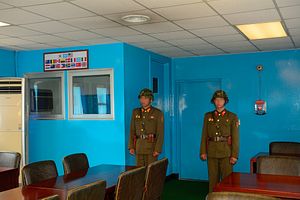North Korean defectors have little hope of finding asylum in Europe due to increasingly strict criteria used to determine claims, according to a report released this week by a U.K.-based advocacy group.
The report by the European Alliance for Human Rights in North Korea says the U.K., France, Belgium, and the Netherlands are rejecting most claims for asylum by North Koreans because they view them as South Korean citizens.
In 2013, the U.K. rejected 30 out of 40 asylum applications made by North Korean defectors, according to the report, titled “A Case for Clarification: European Asylum Policy and North Korean Refugees.” Belgium turned down 99 of 126 claims it received, according to the study. The Netherlands and France, meanwhile, rejected all of the applications they processed – 128 and 19, respectively.
While South Korea’s constitution considers North Koreans to be its citizens, they can only access citizenship in practice if they can escape their homeland, whose totalitarian leadership heavily restricts freedom of movement.
The huge rejection rate for asylum claims in Europe rests on defectors not having a reasonable fear of persecution in South Korea, where defectors are entitled to settle, according to Andrew Wolman, a law professor at Hankuk University of Foreign Studies in Seoul.
“Under South Korean law, North Koreans are (in the vast majority of cases) automatically South Korean citizens. Under international refugee law, therefore, they must have a reasonable fear of persecution in both North and South Korea to be considered refugees,” Wolman, who has written on the issue in the International Journal of Refugee Law, told The Diplomat.
“However, there has been some uncertainty over whether all North Korean escapees are in practice allowed to come to South Korea. If not, then their de jure South Korean nationality may not be ‘effective’ and they should arguably be considered refugees anyway under international law.”
The EAHRNK report notes that South Korea can deny citizenship to defectors in exceptional cases, such as if they are involved in criminality or if they want to apply for asylum elsewhere.
The increasingly unfavorable situation for defectors in Europe mirrors similar developments in Canada and Australia. Canada did not grant a single North Korean asylum in 2014, after accepting 21 claims in 2013 and 203 the year before, according to an article in online magazine The Tyee.
While comprehensive figures are unavailable, Western authorities have in many cases determined North Korean asylum seekers to have previously settled in South Korea.
Though South Korea remains far wealthier and freer than its northern neighbor, many North Korean defectors struggle to adapt to their new lives across the border. A government-sponsored survey last year found that they earn just two-thirds as much as the average South Korean.

































